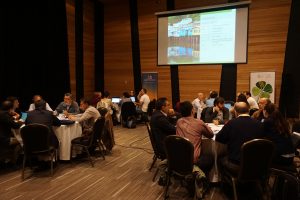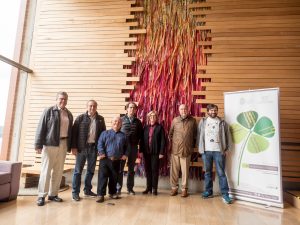Chiloé brings together world experts for the education of young talent
An international advisory board for the Corfo Engineering 2030 UC-USM partnership discussed advances made by each institution in attracting and educating students interested in science and technology.
Specialists in education, innovation, and entrepreneurship sit on the international advisory board for the engineering partnership between the Universidad Católica (UC) and the Universidad Técnica Federico Santa María (USM). The board met this week in Castro, of the Chiloé community, to analyze advances made in the Corfo Engineering 2030 Project.

The board meeting lasted three days.
The meeting, termed the Clover 2030 International Advisory Board Meeting, was led by UC Engineering Dean Juan Carlos de la Llera. Participants discussed subjects related to initiatives led by both institutions in attracting and educating students interested in science and education.
The international UC-USM advisory board meets once a year to support the ongoing development of programs directed at transforming how engineering is taught in Chile. The idea is to close the gap with developed countries through projects in innovation and entrepreneurship.
Among the specialists present were Deans Katherine Banks (Texas A&M University), Patrick Kilpatrick (Illinois Institute of Technology), and Robin Wallace (University of Edinburgh). Entrepreneurs such as Francisco Larraín (Zudo y Zafe) and Fernando Flores (Pluralistic Networks), as well as UC and USM engineering researchers and representatives, were also present.
These international experts recognized the work undertaken in Castro and valued the uniqueness of the host community, which is home to the World-Heritage Churches of Chiloé.
New Engineering

Dean Juan Carlos de la Llera together with specialists.
In 2013, Corfo opened applications to all Chilean engineering schools for the New Engineering for 2030 project, the purpose of which being to transform Chilean schools into world-class institutions. The UC-USM partnership was ranked first among all applicants.
Notable among the advances made by UC and USM is an alliance with UC Berkeley, which allows students, researchers, and businesses to interact with the Silicon Valley ecosystem. Seed Funds have also been established to drive international work with researchers from universities like Columbia, Notre Dame, MIT, and UT Austin in the United States.
In parallel, a required course on R&D was created with UC Berkeley, creating a chance for students to launch a startup guided by mentors, such as Endeavor. This proposal for entrepreneurship in engineering is one of the largest in the world, with nearly 400 students participating each semester.
In addition to the above is work on the new UC Institute for Biological and Medical Engineering. This institute will tackle new challenges in health sector, among other initiatives.




 Español
Español
